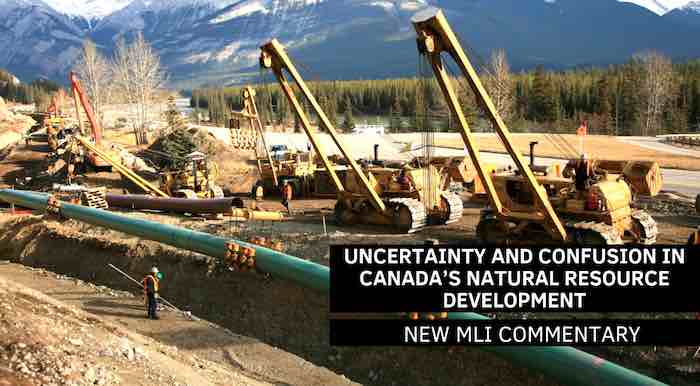New Commentary by Jeffrey Simpson: Uncertainty and Confusion in Canada’s Natural Resource Development
It's no wonder no one wants to invest in Canada's resources

OTTAWA, ON (February 22, 2019): While the modern Canadian economy is largely diversified, the natural resource sector still plays an incredibly important role when it comes to creating economic opportunity and prosperity. So, why can’t Canada seem to get resource development right?
In the latest MLI commentary, long-time Globe and Mail columnist Jeffrey Simpson addresses the “Uncertainty and Confusion in Canada’s Natural Resource Development.” It is a powerful indictment.
“If you believe that fossil fuels will be in demand here and abroad for a very long time,” writes Simpson, “then [Canada’s struggles to get pipelines built and LNG projects off the ground are] bad news for employment, government revenues, economic growth and the Canadian dollar.”
Simpson makes the case that the review process for projects too often bogs down. First Nations with legitimate impact claims are often not clearly understood by all parties; the proper representatives for First Nations communities are often unclear; Canada’s courts seem to muddy the waters even more, unable to provide consistent answers regarding precedent in these cases; government often adds hoops to jump through or new layers of review for projects.
“Time is money, and the more time that is spent consulting and negotiating, the greater the chance that the company will walk away or, looking at precedents, decide not to invest.”
To help bring more clarity to the consultation and negotiation process, Simpson argues that governments should avoid using loose language and trying to please all parties completely. Some examples may be found in the federal government’s approach to “free, prior, and informed consent (FPIC),” and its frequent references to the concept of social licence. Thus far, there is no clear definition of what FPIC means to the government, nor is there any commonly understood definition – legally or otherwise – of social licence. But these empty commitments are seized on by those who oppose any and all oil and gas development.
Instead, governments must focus their efforts on actually delivering a consistent and reliable project review system that is fair for First Nations and other stakeholders while also being timely and predictable for project proponents.
“Projects, properly conceived and executed, must be subjected to reviews for land use, environmental protection, remediation where necessary, impact on nearby communities, and so on,” explains Simpson.
“What is unusual and hurtful is the degree to which in Canada we have added to these necessary conditions, excessive litigiousness, Indigenous legal claims, widespread definitional confusions, regulatory uncertainty and political controversy.”
Simpson concludes that, “until the debate is resolved – if it can be resolved – any company thinking of investing, or any government wishing to promote investment, must tread very warily.”
To learn more about the uncertainty plaguing natural resource development in Canada, read MLI’s latest commentary here.
***
Jeffrey Simpson, an Officer of the Order of Canada, was The Globe and Mail’s national affairs columnist during which time he wrote about almost all the major Canadian public policy issues, and many international questions. He is a senior fellow at the Graduate School of Policy and International Affairs at the University of Ottawa.
Macdonald Laurier Institute -- Bio and
Archives |
Comments
Canada’s only truly national public policy think tank based in Ottawa. MLI is rigorously independent and non-partisan, as symbolized by its name. Sir John A. Macdonald and Sir Wilfrid Laurier were two outstanding and long-serving former prime ministers who represent the best of Canada’s distinguished political tradition. A Tory and a Grit, an English-speaker and a French-speaker, each of them championed the values that led to the creation of Canada and its emergence as one of the world’s leading democracies and a place where people may live in peace and freedom under the rule of law.

 OTTAWA, ON (February 22, 2019): While the modern Canadian economy is largely diversified, the natural resource sector still plays an incredibly important role when it comes to creating economic opportunity and prosperity. So, why can’t Canada seem to get resource development right?
In the latest MLI commentary, long-time Globe and Mail columnist Jeffrey Simpson addresses the “Uncertainty and Confusion in Canada’s Natural Resource Development.” It is a powerful indictment.
OTTAWA, ON (February 22, 2019): While the modern Canadian economy is largely diversified, the natural resource sector still plays an incredibly important role when it comes to creating economic opportunity and prosperity. So, why can’t Canada seem to get resource development right?
In the latest MLI commentary, long-time Globe and Mail columnist Jeffrey Simpson addresses the “Uncertainty and Confusion in Canada’s Natural Resource Development.” It is a powerful indictment.